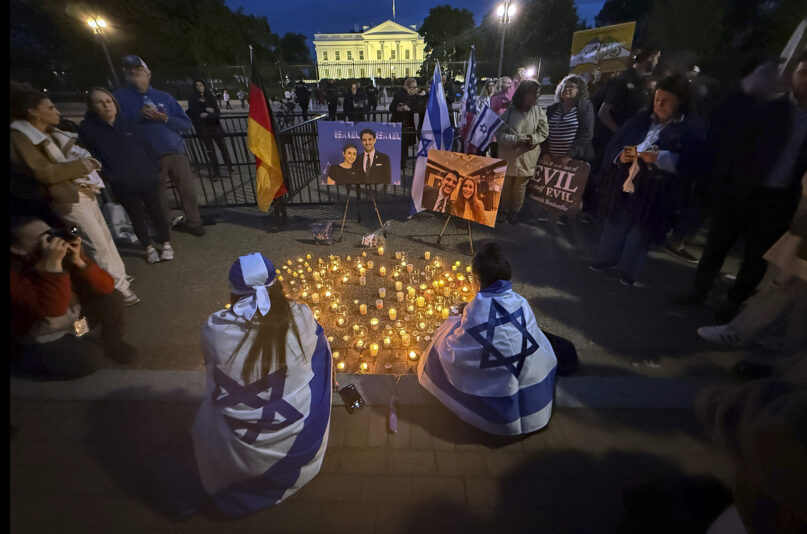(RNS) — In this moment of deep global and national crisis, we, a Muslim American and a Jewish American, find ourselves grieving together. The catastrophic war in Gaza continues to claim Palestinian lives as millions suffer in captivity in prisons, while in the horrific violence of Oct. 7, 2023, more than 1,200 Israelis died and hundreds more were taken hostage. We feel this pain acutely. We mourn for lives lost, communities shattered and a sense of safety that now feels more fragile than ever with the ongoing war.
That grief is compounded by the way violence abroad has reverberated here at home. Since Oct. 7, Palestinian, Arab and Muslim Americans have faced escalating hate, surveillance and repression, from the brutal murder of 6-year-old Wadea Al-Fayoume in his home in Chicago to the horrifying shooting of three Palestinian students — Tahseen Ali Ahmad, Kinnan Abdalhamid and Hisham Awartani — in Vermont.
RELATED: We’re ignoring the power of religion to resolve conflicts
We’ve also mourned the killings of Sarah Milgrim and Yaron Lischinsky, staffers at the Israeli Embassy in Washington, and were horrified by the arson attempt against Pennsylvania Gov. Josh Shapiro, one of the country’s most visible Jewish elected officials.
Most recently, we watched with horror the recent fire attack on peaceful protesters in Boulder, Colorado, as they marched for the release of Israeli hostages in Gaza. And our hearts ache for students across the country who dare to speak up for Palestinian human rights and are silenced, doxxed, vilified, arrested and now targeted for unjust detention. We are indeed living through some perilous times, and this underscores the urgency of resisting dehumanization in all its forms.
Hate crimes against both our communities have surged since Oct. 7. Islamophobic and antisemitic incidents have grown more brazen and violent. Each attack, each slur, each piece of threatening graffiti is not just an isolated act. It reverberates through our communities, reopening collective wounds and feeding the trauma we carry.

People gather to light candles in a makeshift memorial during a vigil May 22, 2025, outside the White House in Washington to honor Yaron Lischinsky and Sarah Milgrim, who were killed as they left an event the night before at the Capital Jewish Museum in Washington. (AP Photo/Jose Luis Magana)
Yet, in this painful landscape, we ask: What does it mean to be a peacebuilder right now? For us, peacebuilding began with friendship.
We met years ago through our shared work to advance social justice in the political sphere in Princeton, New Jersey, and beyond. Our bond deepened when Ramadan and Tisha B’Av overlapped one year; as Muslim and Jewish fasting coincided, we chose to break fast together. We ate, we talked, we prayed. In that simple act of spiritual hospitality, we found a shared language of faith, blooming friendship and a mutual yearning for peace.
In the aftermath of Oct. 7, we were concerned about forces, national and local, that were attempting to pit the Muslim and Jewish communities against each other. We realized that solidarity is not a sentiment; it’s a choice. And we chose to support each other and stand together in that moment.
In January 2024, inspired by friends, we co-hosted an interfaith prayer service for peace in Princeton. With the war in Gaza raging, it was an act of courage — not only for us, but for the Muslim and Jewish community members who showed up, unsure if they could pray in the same room. Together, we mourned our tremendous losses and lit candles against the darkness.
Grateful for this third space, our community wanted more. In fall 2024, we held a second service, and once again, the room filled with people of all backgrounds — Muslims, Jews, Christians and people of conscience. Our group evolved into a sustained effort aimed at peace, called Unity Through Understanding, a grassroots group of Muslims, Jews and allies, including Israelis and Palestinians, committed to peace and shared humanity. It is a small experiment in what’s possible when people refuse to be enemies.
Choosing this path has not come without cost. Members of our group have been criticized, sometimes by our own communities, for standing side by side. We’ve been accused of betrayal simply for calling for a ceasefire or for mourning the lives of people on “the other side.” But we’ve also found new allies, new strength and a renewed sense of purpose.
Because silence is not an option. When antisemitism rears its head, we must speak. When Muslims are vilified or dehumanized, we must speak. Our safety and sense of self are bound up with each other.
We have learned that shared grief can also be the ground for shared hope.
Our communities both carry deep historical trauma. Jews carry the memory of the Holocaust and centuries of antisemitism. Muslims carry the scars of Islamophobia or anti-Muslim hate, war and displacement. Yet when we sit together, when we listen to each other’s stories, something shifts. We recognize ourselves in one another. That recognition is not just healing; it is revolutionary.
At our interfaith services, we read from our sacred texts. We talked about both of our faith traditions, which firmly establish the sanctity of human life. Both the Torah and the Quran state that taking one life is the same as killing all of humanity, and saving a life is the same as saving all of humanity.
We lit candles at the interfaith services in honor of our shared humanity. We told stories of family, of exile, of survival. One reading, Rabbi Irwin Keller’s poem “Taking Sides,” asked us not to choose between peoples or ideologies — but to side with the suffering, the displaced, the grieving. To side with humanity. These meaningful words and messages of our sacred texts continue to guide us.
Today, we issue this call to peacebuilders everywhere: Stand up. Speak out. Do not let the loudest voices be those calling for vengeance or war. Violence begets only more violence. It is time for a different path.
We urge U.S. leaders to act boldly to help end the war and human catastrophe in Gaza by supporting a real, lasting peace between Israelis and Palestinians — one rooted in justice, dignity and equal rights for all.
And we invite others — especially Jewish and Muslim Americans — to come together in their communities. Host a meal. Light candles. Say a prayer. Be open to difficult conversations. Stand side by side in solidarity. Make space for mourning, and for hope. Stay united in the quest for peace.
We know this work is hard. But the rewards are healing for our spirits and our community. Even in this time of war and violence, we believe peace is still within reach.
Let us choose peace together.
(Afsheen Shamsi and Liz Cohen are Muslim and Jewish community leaders from Princeton, New Jersey, who advocate for peace and justice locally, nationally and globally. The views expressed in this commentary do not necessarily reflect those of Religion News Service.)



